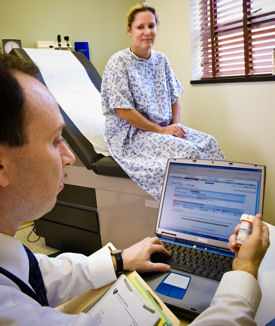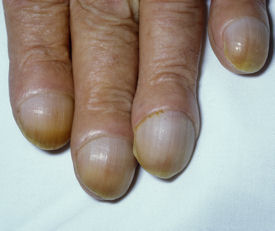Post-war, vets face new battle with PTSD
While the military screens soldiers returning from combat, post-traumatic stress disorder can show up months or years after, when the person may have left the military health system and returned to private care.
The media have reported for months that post-traumatic stress disorder (PTSD), depression and suicide are on the rise in soldiers returning from Afghanistan and Iraq. According to a recent RAND Corp. study, about 300,000 people, or nearly 20% of returning soldiers, have reported symptoms of PTSD or major depression thus far—and general internists are on the front lines of diagnosis and treatment.
While the military health system screens soldiers for mental health problems at least twice within six months of returning from combat, many PTSD sufferers eventually seek care in the private sector. That's because PTSD can show up several months or years after a person leaves the battlefield when the veteran may have left the military health system, or chosen to receive health benefits through an employer or spouse's plan outside of the military.

“PTSD often smolders at a sort of sub-threshold level,” said Barry Fisher, MD, medical director of the behavioral medicine clinic at Highland Drive VA Hospital in Pittsburgh. “A current life stressor—losing a job, getting divorced—can tip the balance, because it brings anxiety and triggers thoughts about the last time the person felt he was in a life-threatening situation.”
Still other veterans may not get immediate treatment because they are reluctant to admit the symptoms of PTSD and depression. The RAND study found that only slightly more than half of those soldiers with PTSD and major depression symptoms actually sought medical treatment. Often, the soldiers said, they didn't get help because they were concerned that having a mental health record would hurt their careers, or that their peers would lose trust in them. Such fears may lead some to seek treatment in the private health sector, if at all.
“There is this macho part of the military where reaching out for mental health services is just not something you do,” said Wayne Katon, MD, vice chair of psychiatry and behavioral sciences at the University of Washington, who has treated veterans. “The military is taking concrete steps to change that, but it's difficult to change a culture overnight.”
Knowing when, and what, to ask
An easy first step internists can take to uncover combat-related PTSD or depression is to know which patients are veterans. That can be as simple as having a question about military service in every patient's medical history paperwork.
To actually ask every patient whether he or she is a veteran during a 10-minute visit is unrealistic, but there are certain situations in which it might make sense, said Kurt Kroenke, MACP, professor at the Regenstrief Institute in Indianapolis.
“Because most veterans are still young men, I'd say if you have a young man come in with unexplained physical and emotional complaints, a single question about whether he has been in a combat situation might be worth asking,” Dr. Kroenke said.
One needn't screen patients for PTSD automatically if they happen to be veterans, he added.
“If a veteran comes in for a cold, should you screen for depression or PTSD? Probably not. But if you know someone is a veteran and he is having headache and fatigue and there is no easy answer for it, or he comes back several times, you should ask a question or two about it,” Dr. Kroenke said.
That question should get at the specific kind of experience the patient had in the war. In order for a patient to have PTSD, he had to have experienced a traumatic event which involved a real or perceived threat to himself or others, and which caused extreme distress at the time, according to Psychiatry Essentials of Primary Care, by Robert Schneider, FACP and James Levenson, MD, published by ACP Press.
The more intense, drawn-out and recurring the trauma, the more likely it would cause PTSD, the book says. Severe bodily injury or victimization (like torture) and the sudden loss of a loved one are also strong predictors of developing PTSD, it says.
Many soldiers returning from Iraq and Afghanistan have had these sorts of qualifying experiences, the RAND report found. Half of those surveyed said that a friend had been wounded or killed, 45% saw dead or seriously-injured civilians, and 10% required hospitalization for injuries themselves. Indeed, exposure to combat trauma was the single best predictor of PTSD and depression in the RAND study.
“If you look at the symptoms of post-traumatic stress disorder in isolation, they might be considered non-specific. But our understanding of them might change if we understand that these symptoms came on following a psychologically stressful event,” said Lt. Col. Michael Jaffee, MD, director of the Defense and Veterans Brain Injury Center, at a State of the Military Health System conference last January.
The most common somatic symptoms of PTSD are fatigue, sleep disturbance, joint pain, memory loss, headache and concentration troubles, according to a 1994 study of Gulf War veterans in the Journal of Psychosomatic Research. The actual defining symptoms, which can be harder to tease out from patients, include re-experiencing the traumatic event(s), avoiding thoughts about the trauma, and being hyperaroused or “on edge.” (See sidebar “Sussing out symptoms of PTSD”).
“I recommend two screening questions: ‘Do you have recurrent nightmares about the trauma?’ and ‘Do you have vivid daytime memories of the trauma?’” Dr. Katon said.
“My clinical experience is that if you don't have one of these two, you don't have PTSD.”
Predisposing factors
Other factors that make a patient more prone to develop PTSD are a lack of social support, life stressors, a history of prior trauma, and a history of comorbid psychiatric disease, according to Psychiatry Essentials of Primary Care. Alcoholism and substance abuse increase the chances, as well, since PTSD sufferers often self-medicate with alcohol or drugs, Dr. Katon said.
Patients diagnosed as depressed but who aren't improving are also possible candidates, as depression is comorbid with PTSD in 80% of cases, Dr. Kroenke noted. So are those who tend to come back for repeat visits of any sort, he said.
The risk rises with repeat deployments. Col. Charles Hoge, MD, director of psychiatry and neuroscience at Walter Reed Army Institute of Research, told Congress last March that nearly 30% of troops who are on their third deployment suffer from serious mental health problems. Mental illness is also more common in veterans returning from Iraq than from Afghanistan, particularly in the case of PTSD, a July 2004 New England Journal of Medicine study found.
Experiencing a concussion during combat increases the risk of PTSD or depression, too. A January 2008 study in the New England Journal of Medicine found that 44% of soldiers who lost consciousness on the battlefield met the criteria for PTSD three to four months after returning from Iraq, compared with 16% who had other injuries and 9% with no injuries. The rate was 27% for those with concussion who didn't black out.
“Being knocked unconscious on the battlefield is about as close as you can come to threatening your loss of life,” said Dr. Hoge, the study's author, during a presentation at the MHS conference last January.
National Guard and Army Reserve soldiers—who, for insurance reasons, are more apt to wind up in a civilian internist's office—are more likely than active duty veterans to show signs of mental illness, according to a November 2007 study of Iraq war veterans in the Journal of the American Medical Association. At six months after return, the PTSD rate among active soldiers was 16.7%; for reservists, it was 24.5%. Depression rates were 10.3% and 13%, respectively.
Veterans' family members may provide a window into a problem with mental health. The JAMA study found that, in the six months following return from the war, veterans experienced a four-fold increase in concerns about interpersonal conflicts. And while veterans themselves may be reluctant to get help due to the stigma of psychological problems, spouses are often more willing to seek care for their loved ones, the JAMA study pointed out.
“Often a patient will say ‘I'm here because my wife told me to be’,” said Dr. Katon.
Treating the problem
When a patient tests positive for PTSD, try to “normalize” the condition by explaining it, Dr. Katon said. Patients often think they are going crazy, and offering a diagnosis can provide relief.
“Tell him that PTSD is a common physiologic response to seeing trauma and terrible things, that it is a disorder precipitated by the stress that he has gone through,” Dr. Katon said. “At the least, the internist should see it as his or her job to do an accurate diagnosis and education of the patient.”
If you decide to refer patients for counseling, find a psychiatrist or psychologist with experience treating combat trauma, advised experts. Most psychotherapy modalities for PTSD are based on the experience of a single traumatic event, like a rape or murder, rather than the sort of repeat trauma a soldier might experience, the JAMA article noted.
Direct patients who prefer treatment outside the VA system to Giveanhour.com, a nonprofit organization of mental health professionals who provide free, confidential counseling to soldiers back from Iraq and Afghanistan. Patients are expected to volunteer for some sort of community service work down the road, in lieu of payment.
For PTSD patients with an alcohol or drug abuse problem, stress that the patient needs to get his or her substance use under control in order for the medication and/or counseling to work, noted Dr. Kroenke.
“If you find that the patient isn't cutting down after you've told them this, they may need to get into some sort of program, because the substance abuse will interfere with the PTSD treatment,” Dr. Kroenke said.
Consider the following when prescribing drug treatment:
SSRIs. Selective serotonin reuptake inhibitors (SSRIs) are the medication of choice for PTSD, and they perform double duty with the depression that is often comorbid.
Because there isn't a big difference between SSRIs as far as effectiveness, a provider might choose one based on the side effects. “If a patient is agitated and experiencing hyperarousal, or is having trouble sleeping, then I might use a more sedating SSRI like paroxetine,” said Matthew Bair, ACP Member, who works in an Indianapolis primary care VA clinic. “In the VA system, it also depends on your formulary, and that can vary by hospital or clinic. I have also used sertraline, fluoxetine and citalopram.”
Drugs to avoid. Steer clear of the selective norepinephrine reuptake inhibitor bupropion, because it has been known to exacerbate PTSD symptoms in some patients. Some also hesitate to use benzodiazepines like alprazolam for anxiety symptoms because they can make symptoms worse and can be addictive, which is an issue since PTSD patients often have substance abuse problems, experts said.
Drug combinations. The alpha-blocker prazosin may help stem nightmares in PTSD sufferers, Dr. Katon said. Trazodone and mirtazapine may also help with insomnia and nightmares, according to Psychiatry Essentials of Primary Care, usually when used with an SSRI. Anticonvulsants are sometimes used as an add-on therapy to treat irritability, while antipsychotics are used with SSRIs to suppress nightmares and flashbacks, said Dr. Fisher.
About 30%-50% of PTSD sufferers will recover within a year, while 20%-25% will have chronic relapses, according to Psychiatry Essentials in Primary Care. Providers might consider telling patients about the possibility of residual symptoms in the long-term, so they don't get discouraged, experts advised.
“As with all diseases, there is a range of severity and response to treatment,” Dr. Katon said. “I think for a lot of people PTSD will be something they combat over a lifetime. It won't go away 100%, but they can get some relief and coping strategies.”




